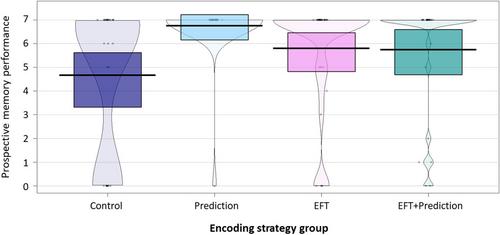From the lab to the classroom: Improving children's prospective memory in a natural setting
Abstract
Background
Laboratory-based studies have shown that children's ability to remember intentions (i.e., prospective memory; PM) can be improved by asking them to imagine performing the PM task beforehand (i.e., episodic future thinking; EFT) or to predict their PM performance. Moreover, combining the two strategies resulted in an additional improvement in children's PM performance. However, the effectiveness of these encoding strategies on real-life PM tasks is still unknown.
Aims
The aim of the present study was to evaluate the effect of EFT instructions, performance predictions, and of their combination on children's PM in a natural setting, namely in the classroom.
Sample
Twelve classes composed by a total of 121 children (53% females) aged between seven and 9 years participated to the study.
Methods
As a PM task, children were asked by their teachers to deliver a letter to their parents and to bring it back to school the next day. Children were divided into four groups: control, prediction, EFT, and the EFT + prediction group. Parent reports on children's everyday prospective and retrospective memory failures were also collected.
Results
Results showed that encoding strategies were effective in enhancing children's PM performance. However, differences compared to previous laboratory-based findings emerged since predicting PM performance resulted to be most effective in enhancing real-life PM performance. Moreover, parent reports were related to children's PM performance.
Conclusions
These novel findings highlight the importance of studying PM interventions in natural settings in order to increase their ecological validity and inform educational practices.


 求助内容:
求助内容: 应助结果提醒方式:
应助结果提醒方式:


